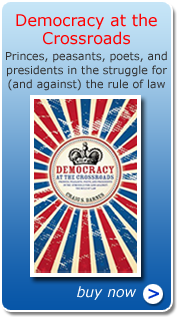Last week, President Bush placed a call to a ranking Iraqi leader pleading that Shiites give more power to Sunnis, even though Sunni numbers include former Baathist followers of Saddam Hussein. Then, on the night of August 26th the US ambassador in Baghdad spent the whole of dark hours and into the next morning trying to persuade the Shiite leadership to do as the president had asked.
The reasons were clear. Sunnis are leading the insurrection and if they do not make political gains in the new government they will continue fighting and killing Americans.
We have therefore come to the point at which Mr. Bush who says he went to war to oust the Sunni Baathists is now trying to re-empower some of the same people he tossed out. Further, having gone to Iraq, (as he now says), to create “freedom,” he has unwittingly fostered a Shiite government composed of those who, of all Iraqis, least support freedom. Even further, an American self-styled Christian president has now fostered a government least supportive of Christians or western family values. Shiites, unlike Sunnis, intend to give Islamic clerics positions on the Supreme Court to enforce Islamic family law, and even authority to insure that all other legislation conforms to Islam. Such provisions are likely to be disastrous for both women and minorities, including of course, Christian minorities and will take Iraq closer to Iran than to the west.
Unfortunately for the president, it is the deposed Sunnis who most would have helped Iraq become a democratic state. They are the ones who most support the rights of women, least support the imposition of Islamic law in the courts, and are most in touch with western science and commerce. Thus, George Bush has gotten himself into the unhappy position of trying to get these Sunnis back into the government while at home he is still telling the American people that these same Sunnis are the excuse and explanation for why he went to war in the first place.
Trying to end the war by re-installing the very people he went to war to toss out is confusing to some and even shocking to others and it is not surprising that the American people are losing confidence in the whole venture.
Most of us would agree that the Sunnis should be in this new government, and most would agree with the American ambassador that he should try his hardest to preserve the rights of women and western legal norms, or that is to preserve the most progressive community in Iraq. But the president is in a rhetorical trap that borders on hypocrisy. He is telling us at home that he threw the Baathists out, and is telling the leaders in Iraq that they should keep Baathists in. He is telling us at home that he is preserving freedom, but the government which he has established is about to ignore him and impose restrictions on women and revert to fundamentalist Islam with very little interest in freedom.
What are we to make of this? Well, one thing is that when we go to war, we ought to be led by people who know what they are doing. A military commander needs to know where the rivers are, where the gorges are, where are the ridges that he can defend. A political commander needs to know the politics; who is who, and who will align with whom. When a substantial number of Americans told Mr. Bush, before he went into Iraq, that he would end up with this mess he did not know enough about the Middle East to know that they were right. He was a commander who did not know the political terrain and now its currents and whirlpools have nearly drowned him.
The irony is that Mr. Bush’s father did know. The first president Bush did not invade Iraq when he had the chance precisely because he did know that he would unleash forces and powers that could not be controlled by Americans, that we would slowly sink into the swamp of sectarian Islamic politics. The father did not take us down that road. The father, of course, knew a lot more about the world than did the son. The father had been UN ambassador, ambassador to China, head of the CIA. The son had owned an oil company and a baseball team and been governor of Texas. The son was simply not prepared.
Next time we choose leaders, including people for Congress and the Senate in next year’s elections, let us not discourage people of intelligence and experience. We need more of both. If we do not get them, the president is apt to have to go on making phone calls to try to put back into power the same people he has just tossed out.
